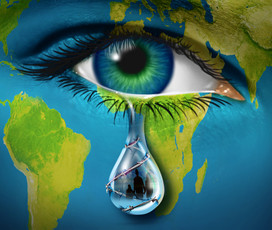Trade clearly benefits both sides or else they wouldn’t do it. Still, there can be huge collateral damage among those not party to the decision: in a faultless application of free trade principles, the (predominantly English) landowners in Ireland exported wheat throughout the Potato Famine of 1845-49 because it was more profitable.
Similarly today, an African landowner may profit more from growing flowers for export to Europe than food for local consumption. The labourer still has a job, but what the local work, land and water produces is flown out of the country for the benefit of someone else.
Without foreign trade, the landowner would have helped to feed his country instead of decorating ours, with more local food and lower prices. The export earnings may raise the landowner’s profits without exerting any upward pressure on the labourer’s wage, perhaps funding labour-saving technologies that would instead push wages down and see fewer people employed on the land.
Alternatively the money may be squirreled away in foreign bank accounts or, worse, used to buy guns and other technologies that insulate the rich in developing countries from the legitimate demands of the poor. That means the poor lose twice over, seeing the product of their land, water and labour exported, and the tools of their repression bought with the proceeds.
For the developed world, capitalism has been a liberating experience, creating a rights culture that culminated in the welfare state. Capitalism permits ownership and commerce, arguably to the point of exploitation. But ownership and commerce need protection: laws to guard against expropriation and to enforce contract on everyone from the monarch down, governing everything from employment to planning to commerce; and capitalism needs laws and rights to govern the society of strangers that complex production and city-living create. Emile Durkheim first identified this over a hundred years ago.
These rights proved conducive to the development of civil society. Marx understood this and insisted on a capitalist stage prior to socialism. Without it, the personal freedoms we now enjoy would be simply unimaginable. Yet capitalism did not yield our rights easily. Instead we endured centuries of sometimes violent struggle as the working class exacted concessions from the industrialists and aristocrats, from factory conditions to the franchise. However the challenge today has become far greater.
As today’s poor try to exact political and economic concessions from their domestic elite, they must also contend with the diktats of the World Trade Organisation and International Monetary Fund. Much of the real power is located elsewhere, largely immune to local demands. No such ultra-power existed during our transition to capitalism, weakening the claim that free markets will lead to civil rights.
Moreover it is not free markets we are foisting on vulnerable people but free trade. The latter operates primarily at the supra-national level, constraining government subsidies and allowing goods and services to be sold in other countries without interference. The national economies may still be monopolistic or corrupt, allowing the elite to keep the gains for themselves.
Free markets liberated us from the undemocratic power of church and aristocracy. Free trade can entrench power, concentrate wealth, limit the scope of civil society, and undermine prospects for economic and political development. We are exporting the economics of capitalism while keeping the rights culture for ourselves.
If land ownership is widely spread, if people have political rights, if employment expands and profits are taxed, then the poor can benefit from trade. But where people lack rights, where they can’t elect their government or join a trade union, those people are cheaper to employ and easier to exploit. So free trade gives dictatorships a competitive advantage in the global economy.
Although buying from dictatorships cuts the cost of our imports, benefiting from such trade is both immoral and short-sighted. It is fundamentally in our interests to see democracy flourish in the world. Democracies account for the bulk of demand in the global economy, and tariffs that penalise dictatorships would help to level the playing field for international trade.
Obviously some countries would resist reforming the WTO to strip dictatorships of their competitive advantage. The Chinese government would not be happy, as they benefit hugely from a captive workforce. Still, it would help address an important imbalance in the global economy, and some Chinese would benefit from the switch towards domestic demand. Others would lose their jobs, though that work would go elsewhere, perhaps to a fledgling democracy that could do with the help. And the Chinese people might be the real winners from a global trade system that promotes democratisation rather than funding their oppression.
Capitalism is hugely powerful, and changes to the trade system could make it a force for good as well as for gain. Democracies should use their dominance in the global economy to force human rights down the supply chain, exacting higher tariffs from countries that do not allow their populations to have basic freedoms.
